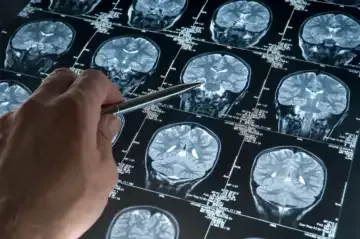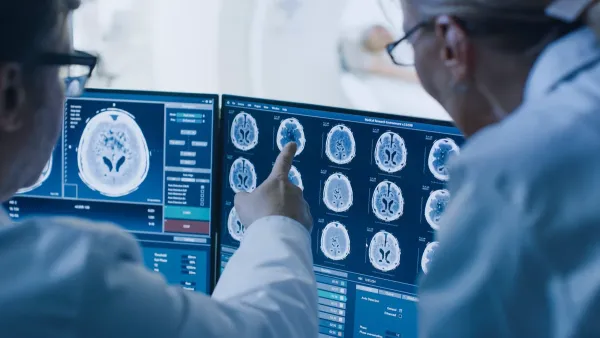The brain scanning technology introduced by NHS England has been shown to reduce the time between someone presenting at a hospital with a stroke and receiving treatment by more than 60 minutes - potentially tripling the likelihood of recovery without a disability.
Experts have hailed the tool as "key" to helping medics rapidly diagnose and treat strokes, saying it allows doctors to make "faster decisions" and ultimately improve outcomes for patients.
During a stroke, the blood supply to part of the brain is blocked or reduced, which leads to brain cells dying at a rate of around 2 million per minute. The earlier doctors are able to diagnose and treat the condition, the less likely patients are to experience long-term disabilities such as paralysis, memory loss and communication problems.
The tool has been used to interpret more than 60,000 patients brain scans across 100 NHS stroke services since last summer, leading to more patients receiving "potentially lifesaving treatments" earlier. Data shows more patients are receiving thrombolysis, a procedure that can significantly improve stroke outcomes by breaking down clots in blood vessels when given in early stages, year-on-year.

David Hargroves, NHS England's national clinical director for stroke, said: "This AI decision support technology is revolutionising how we help people who have been affected by a stroke.
"It is estimated a patient loses around 2 million brain cells a minute at the start of a stroke, which is why rapid diagnosis and treatment is so critical.
"AI decision support software provides real-time interpretation of patients' brain scans - supporting expert doctors and other NHS staff to make faster treatment decisions.
"NHS stroke teams have been leading the way in rolling out AI, and with every stroke centre now using the technology, it is already playing a key role in improving the care of thousands of people in England every year."
The breakthrough technology has been used to support patients such as 55-year-old Shawn Theoff from Canterbury, who said he was given a "lifeline" after suffering a stroke.
He was rushed to Kent and Canterbury Hospital, where he was immediately taken for a brain scan and quickly diagnosed with a stroke thanks to the AI software. He has now been able to regain movement and sensation, and spent less than 48 hours in the acute stroke unit at the hospital before returning home to recover.
Mr Theoff said:"I was making a coffee and all of a sudden I was knocking things over, and I couldn't focus properly so I knew something wasn't right. I couldn't feel my hands and was struggling to use my phone. I eventually managed to get hold of my brother and he rang 999 for an ambulance.
"I can't thank the staff enough and I really feel that the speed of treatment I received has helped with my recovery. I was up and walking about in the ward really quickly and I feel so lucky - I could've had serious issues.

 David Hargroves, NHS England's national clinical director for stroke, said: "This AI decision support technology is revolutionising how we help people who have been affected by a stroke.
"It is estimated a patient loses around 2 million brain cells a minute at the start of a stroke, which is why rapid diagnosis and treatment is so critical.
"AI decision support software provides real-time interpretation of patients' brain scans - supporting expert doctors and other NHS staff to make faster treatment decisions.
"NHS stroke teams have been leading the way in rolling out AI, and with every stroke centre now using the technology, it is already playing a key role in improving the care of thousands of people in England every year."
The breakthrough technology has been used to support patients such as 55-year-old Shawn Theoff from Canterbury, who said he was given a "lifeline" after suffering a stroke.
He was rushed to Kent and Canterbury Hospital, where he was immediately taken for a brain scan and quickly diagnosed with a stroke thanks to the AI software. He has now been able to regain movement and sensation, and spent less than 48 hours in the acute stroke unit at the hospital before returning home to recover.
Mr Theoff said:"I was making a coffee and all of a sudden I was knocking things over, and I couldn't focus properly so I knew something wasn't right. I couldn't feel my hands and was struggling to use my phone. I eventually managed to get hold of my brother and he rang 999 for an ambulance.
"I can't thank the staff enough and I really feel that the speed of treatment I received has helped with my recovery. I was up and walking about in the ward really quickly and I feel so lucky - I could've had serious issues.
David Hargroves, NHS England's national clinical director for stroke, said: "This AI decision support technology is revolutionising how we help people who have been affected by a stroke.
"It is estimated a patient loses around 2 million brain cells a minute at the start of a stroke, which is why rapid diagnosis and treatment is so critical.
"AI decision support software provides real-time interpretation of patients' brain scans - supporting expert doctors and other NHS staff to make faster treatment decisions.
"NHS stroke teams have been leading the way in rolling out AI, and with every stroke centre now using the technology, it is already playing a key role in improving the care of thousands of people in England every year."
The breakthrough technology has been used to support patients such as 55-year-old Shawn Theoff from Canterbury, who said he was given a "lifeline" after suffering a stroke.
He was rushed to Kent and Canterbury Hospital, where he was immediately taken for a brain scan and quickly diagnosed with a stroke thanks to the AI software. He has now been able to regain movement and sensation, and spent less than 48 hours in the acute stroke unit at the hospital before returning home to recover.
Mr Theoff said:"I was making a coffee and all of a sudden I was knocking things over, and I couldn't focus properly so I knew something wasn't right. I couldn't feel my hands and was struggling to use my phone. I eventually managed to get hold of my brother and he rang 999 for an ambulance.
"I can't thank the staff enough and I really feel that the speed of treatment I received has helped with my recovery. I was up and walking about in the ward really quickly and I feel so lucky - I could've had serious issues.